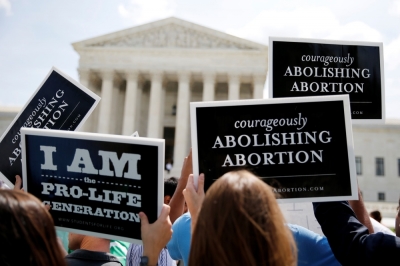Abortion restrictions are lowering abortion rates

On NRO, Kyle Blanchette and Robert VerBruggen both made strong arguments that abortion restrictions can reduce abortion rates. I have noted on NRO in the past that pro-life gains in the court of public opinion have forced our ideological opponents to change their strategy. Instead of arguing that pro-lifers are philosophically wrong, supporters of legal abortion often argue that our policies are ineffective. They frequently cite studies claiming to show that pro-life laws are ineffective and suggest that pro-lifers should support more-generous spending on welfare, health care, or contraception as a strategy to reduce abortion rates.
In reality, there is a substantial body of academic research demonstrating that the incidence of abortion is sensitive to its legal status. The best study on this subject was published in the Journal of Law and Economics in 2004, specifically analyzing Eastern-European countries after the fall of Communism. Some countries, such as Romania, liberalized their abortion laws while others, such as Poland, instituted legal protections for the unborn. The study held constant a range of economic and demographic variables and found that modest abortion restrictions reduced abortion rates by 25 percent. Stronger limits had an even larger effect.
That said, the new National Bureau of Economic Research (NBER) study, which purports to show that pro-life parental-involvement laws are having a diminished impact in recent years, is interesting. I have a few thoughts about the findings. First, the overall abortion rate has fallen by 50 percent since 1980, but the abortion rate among minors (ages 15-17) has fallen by more than 80 percent over the same time period. It is reasonable to think that parental-involvement laws might have less of an effect as the incidence of abortion among minors goes down.
There are other factors as well. A preliminary reading of the study finds that the authors may have not considered the impact of other types of state-level pro-life laws. Additionally, greater availability of the morning-after pill might be reducing the effect of parental-involvement laws. Also, the only three states where parental-involvement laws took effect after 2010 are Illinois, Alaska, and New Hampshire. These states are not socially conservative, and it is possible that judges in these states might be more willing to approve judicial-bypass requests from minors seeking abortions. Finally, these three most recent laws are parental-notice laws, not parental-consent laws. Even though the NBER study did not find that parental-consent laws had a larger impact than parental-notice laws, this is still a topic worthy of further analysis.
This new study opens up some interesting avenues for future research, but it should not detract from the substantial body of peer-reviewed research indicating that pro-life laws reduce abortion rates. In fact, the NBER study cites 16 studies analyzing data from a range of states and years, showing that parental-involvement laws reduce the incidence of abortion among minors. There is a consensus that the federal Hyde Amendment saves thousands of lives each year, and a 2009 Guttmacher literature review noted that the vast majority of studies analyzing state-level public-funding limits found that these laws also lower abortion rates. The evidence is clear that protective laws will continue to save unborn children.
Originally posted at nationalreview.com



























